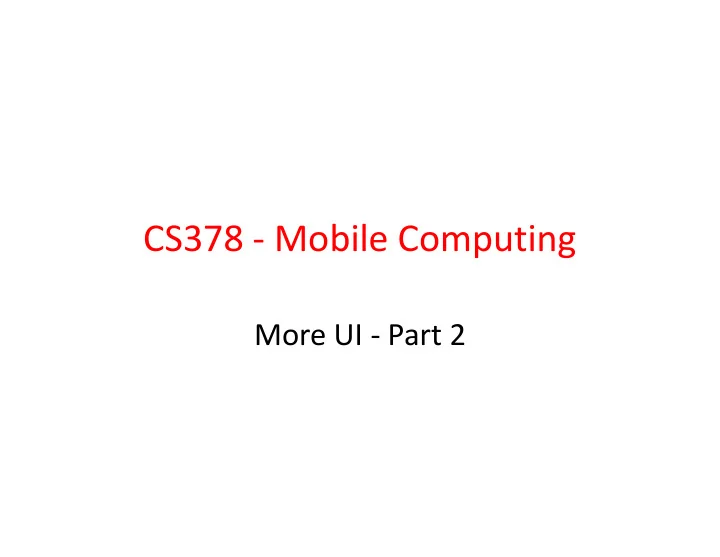

CS378 - Mobile Computing More UI - Part 2
Special Menus • Two special application menus – options menu – context menu • Options menu replaced by action bar (API 11) menu action bar 2
OptionsMenu • User presses Menu Button • Activities onCreateOptionsMenu method is called • In example options_menu.xml in res/menu folder 3
OptionsMenu • Alternate creation of OptionsMenu • add item to menu programmatically • chained method calls 4
SubMenus • Option on Menu may be creation of a SubMenu • In XML nest menu inside menu or programmatically by adding SubMenus to Menu in onCreateOptionsMenu method 5
Menu Options Selected • if Menu Option is another Activity it is launched when Menu button pressed – The Big About in previous example • For other items – onOptionsItemSelected(MenuItem item) 6
ACTION BAR 7
ActionBar • Introduced in Android 3.0 – Honeycomb, tablet only • 4.0, Ice Cream Sandwich, tablet and phones • "The action bar is a window feature that identifies the application and user location, and provides user actions and navigation modes" • http://developer.android.com/guide/topics/ui/actionbar.html 8
Purpose of ActionBar • identification • navigation • actions Overflow Navigation Tabs Menu Action Item Icon / Logo 9
ActionBar • ActionBar items declared in menu.xml 10
ActionBar • If menu items declared in xml, added to menu in order they appear • Extra items brought up with menu button 11
Navigation Tabs • Used to switch between fragments http://developer.android.com/guide/topics/fundamentals/fragments.html • 12
ContextMenu • pre 3.0, aka Floating Menus • subtype of Menu • display when a long press is performed on a View – Activity is a descendant of View – Activity may be broken up into multiple views • implement onCreateContextMenu method • must call registerForContextMenu method and pass View 13
ContextMenu • From Tip Calculator • Long press on total amount EditText • Default behavior for EditText • Nothing added in TipCalculator to create this 14
Contextual Action Mode • 3.0 and later http://developer.android.com/guide/topics/ui/menus.html#CAB 15
STYLES 16
Styles • Defined in XML file • res/values/style • similar to a cascading style sheet as used in html • group layout attributes in a style and apply to various View objects (TextView, EditText, Button) 17
Sample Styles, in styles.xml 18
Apply Style - in main xml 19
Result of Styles • can override elements of style – bottom edit text overrides color • one style can inherit from another • use UI editor to create view and then extract to style 20
GESTURES 21
Common Gestures 22
Common Gestures http://developer.android.com/design/patterns/gestures.html 23
Common Gestures • Fling or flick gesture: similar to swipe or drag • scroll/swipe/drag – user presses then moves finger in s steady motion before lifting finger • fling or flick – user presses then moves finger in an accelerating motion before lifting 24
Dealing With Gestures • To handle simple touch events create View.OnTouchListener for view • Example from tutorial, screen press leads to player moving if it is their turn and they touch an open square 25
onTouchEvent • passed a MotionEvent object with a large amount of data • in tic tac toe tutorial you only used location of event (x and y) 26
Handling Common Gestures • Instead of trying to decode gestures from the MotionEvent passed to on touch … • Use the GestureDetector class • Add a GestureDetector object to View • override View.onTouhcEvent method to pass MotionEvent on to the GestureDetector.onTouchEvent method 27
Handling Common Gestures • create a GestureDetector.OnGestureListener (seveal gestures) or a GestureDetector.SimpleOnGestureListener ( more gestures) and register it with the GesturerDetector • callback methods for onDoubleTap, onLongPress, onScroll, onFling, onSingleTapConfirmed, many more 28
Complex Gestures • Non standard gestures required lots of code to recognize • Android 1.6 introduced new APIs to store, load, draw, and recognize gestures • Gesture Builder app on emulator – emulator must include virtual SD card – allows creating set of gestures for your ppliaction 29
Complex Gestures • Each gesture associated with name • multiple gestures can have same name – variations on same gesture, better chance of recognizing • Move gestures from emulator to application res/raw folder 30
Complex Gestures • Recognizing gestures via a GestureOverlayView • simple drawing board on top of view that shows and records user gestures • When gesture complete GestureLibrary queried to see if gesture is recognized • Predictions between entered gesture and those in the library 31
Animal Sounds App 32
Predictions 33
onCreate 34
Listener 35
Recommend
More recommend